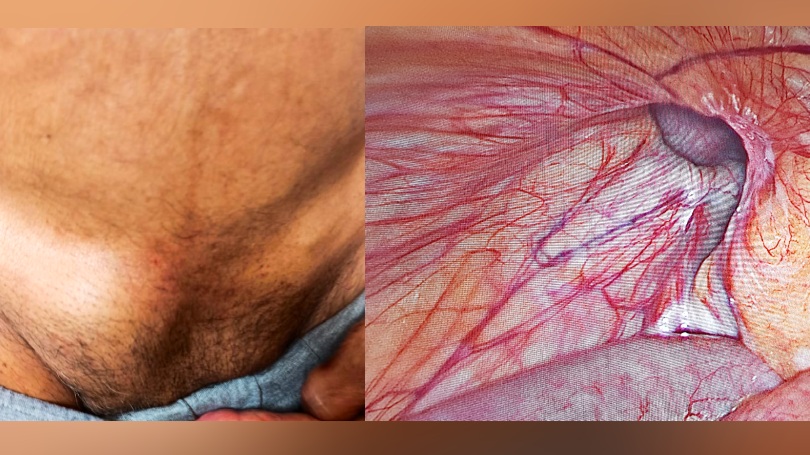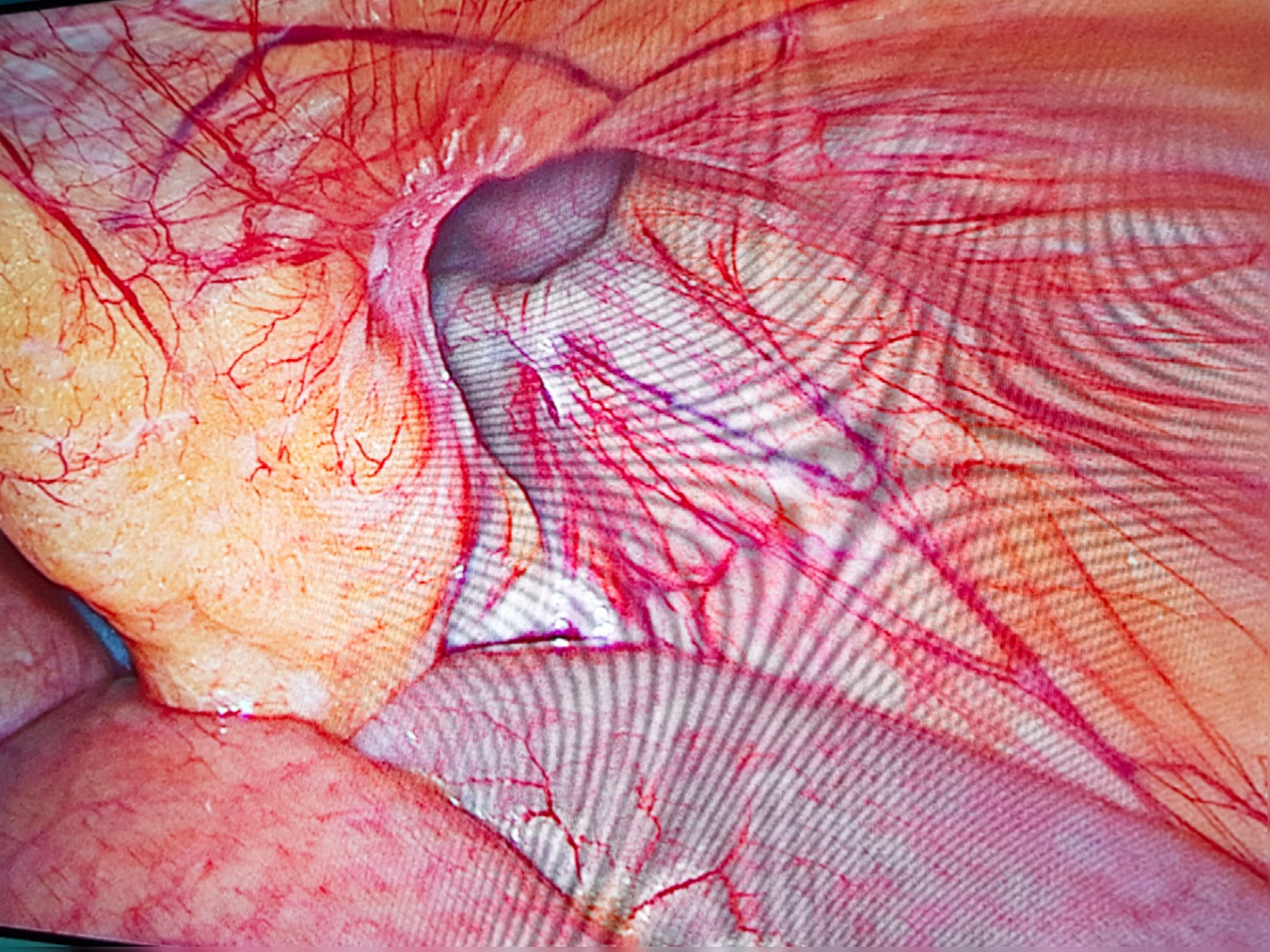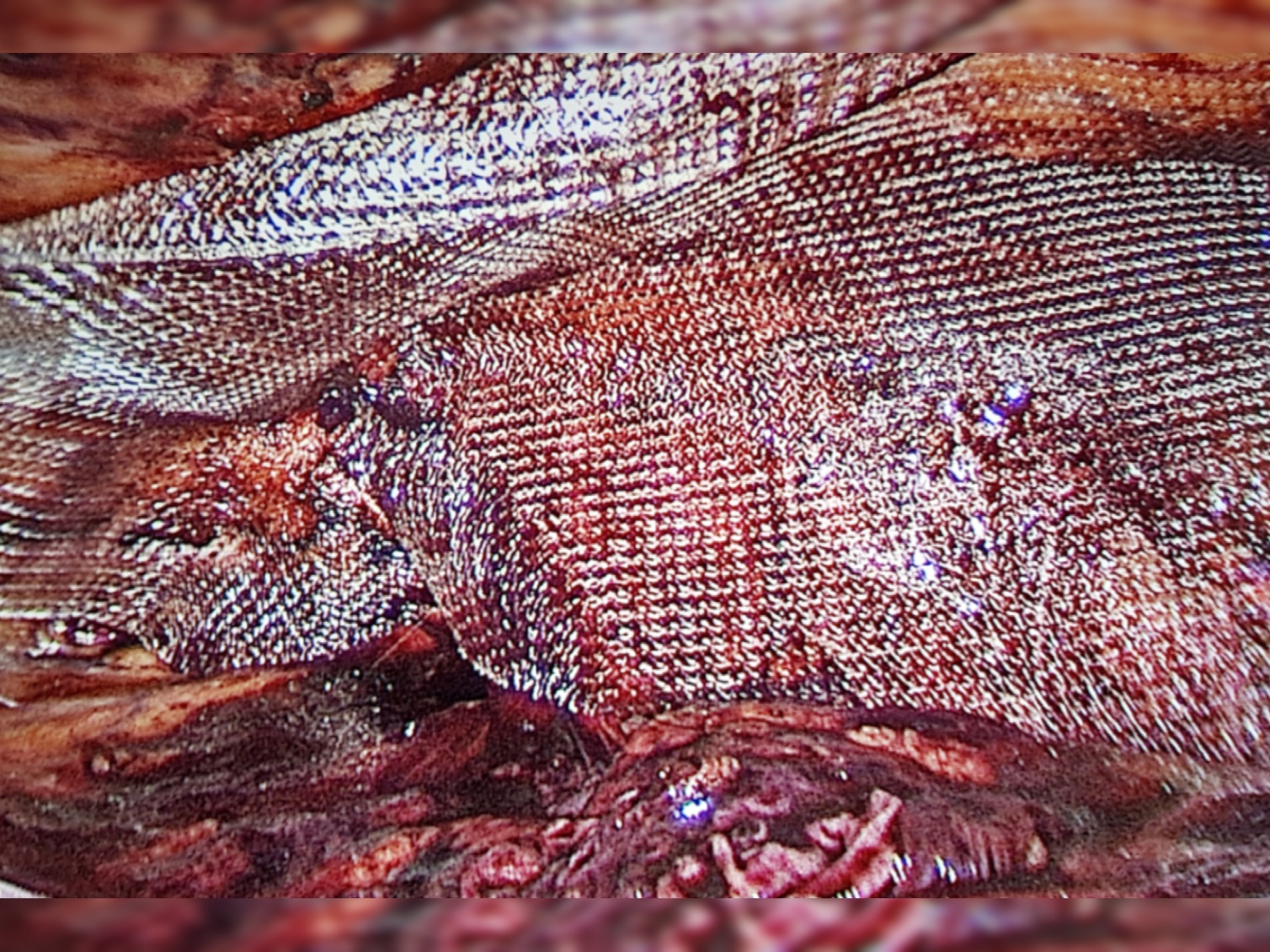-

What is Inguinal Hernia?
Hernia occurs when tissue, such as part of the intestine or fat (omentum) protrudes through a weakness or opening in the abdominal wall. Based on the location and the etiology, hernias are classified. Hernia that is located in the groin along the inguinal canal is called inguinal hernia. There are two types of inguinal hernia: direct hernia and indirect hernia. However the inguinal hernia treatment is the same irrespective of the type of hernia.
Inguinal hernia usually presents as a lump in the groin. Sometimes patients complain of pain or dull aching sensation with the lump. In extreme cases the hernia can be as large as a soft ball going down into the scrotum which is called inguinoscrotal hernia. Inguinal hernias can be identified by clinical examination and confirmed by ultrasound test.
Direct And Indirect Inguinal Hernia
There are two types of inguinal hernias- direct and indirect inguinal hernia.
- Direct Inguinal Hernia: Direct inguinal hernia usually occurs in adult males and is majorly caused by the weakness in the muscles of the abdominal wall or because of heavy lifting or straining.
- Indirect Inguinal Hernia: Indirect inguinal hernia occurs by a birth defect in the abdominal wall that is present at birth.It is to be noted that hernias can also be on both sides of the abdomen. Direct inguinal hernias usually occurred usually later in life as the abdominal wall weakens with age. An inguinal hernia is not always life-threatening, however, it can cause severe pain while bending, straining with a bowel movement, lifting, or even coughing.
Signs and Symptoms Of Inguinal Hernia
As mentioned above, some inguinal hernias can also be painless or show no inguinal hernia symptoms, especially in the initial stage. However, inguinal hernia symptoms start to appear with time, some of which are as follows:
- A protrusion in the area on either side of the pubic bone that appears in a more obvious way when you are upright or coughing.
- A dragging or cumbersome sensation in your groin.
- An aching or burning sensation around the bulge.
- Pressure or weakness in your groin.
- Discomfort or severe pain in your groin area, particularly when you cough, bend over, or lift heavy objects.
- Swelling and pain around your testicles when the bulging intestine moves down into the scrotum.The major inguinal hernia symptom is a bulge in the scrotum or groin. It usually appears as a round lump. This bulge may form over a period of weeks or months. It can also suddenly appear with pain at times. Some other signs of inguinal hernia are sudden pain, vomiting, and nausea which means that a part of your intestine may have been trapped in the hernia.
Diagnosis Of Inguinal Hernia
If you suspect that you are suffering from an inguinal hernia, it is important that you seek medical attention immediately. If left untreated, an inguinal hernia can even develop into a serious health condition. During the diagnosis of an inguinal hernia, your doctor will ask you about your family history as inguinal hernias may run in your family. Your healthcare provider may then perform a physical exam to check for a hernia bulge. They will ask you to strain or cough to check if the hernia comes out. They may also order a CT scan or X-ray to look for a hernia and examine if it is incarcerated or strangulated.
Treatment of Inguinal Hernia
Your doctor can reduce or push a small inguinal hernia back into your abdomen with a gentle massage. However, if this does not work, then they will advise you to go through a laparoscopic inguinal hernia surgery. This surgery is performed to repair the opening in the muscle wall. Laparoscopic inguinal hernia surgery mainly comprises minimally invasive techniques.
-
Surgery


There are two types of surgeries that are offered for patients suffering from inguinal hernia. The standard is to use a mesh for all types of hernia repair. Open inguinal hernia repair with mesh and the other most common type of surgery is Laparoscopic inguinal hernia repair with mesh. Broadly these surgeries based on the technique can be classified as OPEN SURGERY and MINIMALLY INVASIVE SURGERY.
OPEN SURGERY- Open Inguinal hernia repair with mesh
Open surgery involves open technique. Here an incision is made on the hernia near the inguinal ligament measuring 4 to 3cm in size. The inguinal canal is explored , the hernia sac is identified and excess sac is excised if necessary. The hernia is repaired with mesh. The surrounding structures are evaluated and the incision is closed.
Open surgery is usually more painful than the minimally invasive surgeries. But there are various medications that we use to help you have better pain control.
For this surgery you may need a complete blood count (CBC), chemistry profile, PT, PTT. Depending on your medical history, we may require additional testing: chest X-Ray, EKG, medical clearance from your primary care physician, cardiac clearance from your cardiologist, additional blood work and finally Anesthesiology clearance.
We recommend that you have your blood work done before having the surgery performed. If this is not possible, please notify the surgical scheduling team at 8884200030.
MINIMALLY INVASIVE SURGERY- Laparoscopic Inguinal hernia repair with mesh
Laparoscopic surgery involves minimally invasive technique. Here we make small 5 mm incisions on the sides of the abdomen and small 10 mm incisions near or at the umbilical area. The abdomen is entered and hernia and the sac is identified. The lining of the abdominal wall is mobilized including the hernia sac. The area where the defect is closed with mesh and the lining is replaced into its place. The surrounding structures are evaluated and the incision is closed.
Laparoscopic surgeries are usually less painful than the open surgeries. We still give you pain medications and nerve blocks so that you feel comfortable and are able to walk about six hours after the surgery.
For this surgery you may need a complete blood count (CBC), chemistry profile, PT, PTT. Depending on your medical history, your physician may require additional testing: chest X-Ray, EKG, medical clearance from your primary care physician, cardiac clearance from your cardiologist, additional blood work and finally Anesthesiology clearance.
We recommend that you have your blood work done before having the surgery performed. If this is not possible, please notify the surgical scheduling team at 8884200030.
-
Patient education
BEFORE SURGERY
Please refer to the instructions below in preparation for your surgery. Proper preparation is essential to obtain the best surgical experience and results. Please note that failure to follow these instructions may result in rescheduling your surgery. Our team will contact each patient directly and will be available to answer any additional questions about surgery, scheduling and instructions.
PRE-OPERATIVE TESTING
You may need a complete blood count (CBC), chemistry profile, PT, PTT. Depending on your medical history, your physician may require additional testing: chest X-Ray, EKG, medical clearance from your primary care physician, cardiac clearance from your cardiologist, blood work and anesthesiology clearance.
We recommend that you have your blood work done at the hospital where you are having the surgery performed.Please download the instructions below if you need any further instructions, please notify the surgical scheduling team at 8884200030
Our Specialists
We, at MH Surgery Clinic, comprise a team of the best surgeons who are globally recognized in their field. They have immense expertise in the management and diagnosis of multiple conditions, and in the innovation of minimally invasive surgery techniques. Our doctors provide a personalized approach for each patient, depending on their condition, thereby giving advanced surgical solutions. So, if you are suffering from an inguinal hernia, then MH Surgery Clinic is the best place for your inguinal hernia operation.
-
why us?
Our minimally invasive Surgeons are well known internationally in their field. They are experts in the diagnosis and management of various conditions, and innovation of minimally invasive surgery techniques. Our team provides a personalized approach for each patient, offering advanced surgical solutions. Our surgeons educate physicians on innovative techniques through national, international presentations and web-based seminars.
Frequently Asked Questions
Answer: The operation usually takes about 30 to 45 minutes to complete and you'll usually be able to go home on the same day. Some people stay in hospital overnight if they have other medical problems or live on their own.
Answer: Laparoscopic or Closed Repair.
Answer: Most people who have open hernia repair surgery are able to go home the same day. Recovery time is about 3 weeks. You most likely can return to light activity after 3 weeks. Strenuous exercise should wait until after 6 weeks of recovery.
Answer: MIA MH Surgery Clinic has known to be the best Inguinal Operations & Surgeries in Bangalore.

